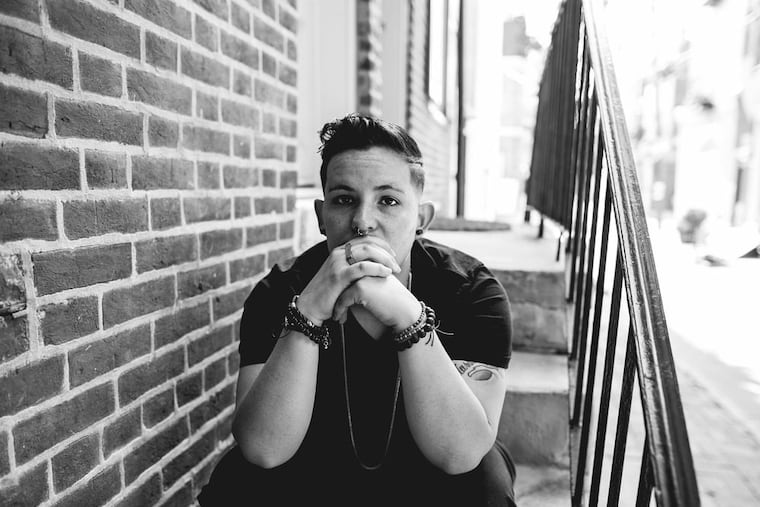I'm a queer Latinx woman. Philly's Women's March didn't represent me this year | Perspective
Instead of trying to understand the perspective of a different community member, I was asked to change my behavior to conform.

Sunday morning was a bittersweet moment for me. When I saw the front pages of all the newspapers, each featuring photos from women's marches around the world, I felt both proud and despondent.
Marches and rallies have been at the core of my professional work as a long-time activist, community organizer, and currently the executive director of Galaei, a queer Latinx social justice organization. I was pleased and inspired to see so many people rallying for the second year in a row, but I also couldn't shake the statistics that resound in my head everyday:
Over 53 percent of white women voted for Donald Trump.
Twenty-six trans people were murdered in 2017, making it the deadliest year for that community.
Native Americans are killed in police encounters at a higher rate than any other racial or ethnic group.
Black and brown people face an alarmingly disproportionate rate of violence at the hands of police.
Thousands of black and brown immigrants daily face the risk of deportation and a highly anti-immigrant, Islamophobic American climate.
Many participants in the Women's March — both last year and this year, in Philly and beyond — marched against Trump and his administration. They did not march against systemic racism, hyper-capitalism, deliberate neglect of the poor, militarism or imperialism, all of which are the root reasons why these statistics exist.
Trump and his administration are symbolic of many systemic forms of oppression, but these oppressions have existed for a long time, regardless of who has been in the White House.
I didn't march on Saturday because, as a queer Latinx person, I'm exhausted in my relationships with white women and allies. (I identify as Latinx, which is the gender-neutral alternative to Latino, Latina and even Latin@. It's part of a "linguistic revolution" that aims to move beyond gender binaries and is inclusive of the intersecting identities of Latin American descendants. In addition to men and women from all racial backgrounds, Latinx also makes room for people who are trans, queer, agender, non-binary, gender non-conforming or gender fluid.)
Here's an example: In the days leading up to the march, conversations erupted in Philadelphia about the organizing committee's official stance on whether pink pussyhats were truly inclusive, since not all women identify with them. One of the organizers reacted by saying she did not want to get "caught up in these little conversations about a damn hat." This response felt apathetic and dismissive of these very real concerns.
When I brought this up on the Galaei Facebook page, a march organizer said a women of trans experience and another women of color had been involved in the planning. She then gave instructions on what one could "do" and "read" to better understand the issue.
Instead of letting me explain why my perspective was different, I was asked to change my behavior to conform.
This situation was infuriating but all too common. When confronting the problematic nature of white feminists, I've often been told to ignore the differences that separate our experiences for the "greater good" of unity. I am reduced to being "divisive," when in fact I am trying to be inclusive.
A march for women should center on and uplift all women, including trans women of color. Organizers should ensure that there is equitable representation, beyond visibility onstage, with the intention to represent even the most marginalized communities. Queer and trans women of color must be part of the vision, strategy and decision making. A march for women should actively question the levels of privilege and power that exist in our society and strive to overcome those issues.
I'm reminded of this Audre Lorde quote that rings true today:
If white American feminist theory need not deal with the differences between us, and the resulting difference in our oppressions, then how do you deal with the fact that the women who clean your houses and tend your children while you attend conferences on feminist theory are, for the most part, poor women and women of color? What is the theory behind racist feminism?
I knew I would not feel comfortable participating in the Women's March this year, especially when I heard about the planned police presence. After experiencing my own forms of police brutality just two months ago, I was reminded that police presence does not always mean safety for people like me.
As an organizer and activist, I've learned that my energy is both powerful and vulnerable. Too often, social justice work can burn out a person because it is a lifetime commitment to resist, in our everyday actions, not just one march.
One step that organizers can take to make next year's march more inclusive would be to commit to developing the leadership of black, brown, queer and trans women. Often we are invited to speak at events, but when will our voices be heard not just as talking heads, but as an equal part of the solution to confront and dismantle systems of power?
My hope for those who participated: Let this not be your last time. Visit your local organizing groups to see how you can participate. Read the queer and trans movement literature. And never stop interrogating the purpose of why and how you march.
Nikki López is a writer, poet, DJ, activist and executive director of Galaei, a queer Latinx social justice organization. @djniilo